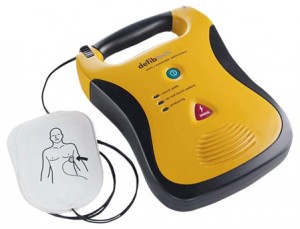DID YOU know that if you have a cardiac arrest outside of hospital and with no trained people nearby, your survival rate is just 6%? Incredibly, this rises to 60% if there is a defibrillator to hand.
These statistics, coupled with recent events like the tragic death of schoolboy Luke Chapman while playing rugby, highlight the need for clubs and schools to have adequate training and equipment.
There are screening programmes aimed to pick up heart problems, but they only detect 60-80% of conditions. For example, Bolton footballer Fabrice Muamba had been screened three times but still suffered a cardiac arrest when he was playing against Tottenham. In that instance, it was the pitch-side medical staff and defibrillator that helped to save his life.
Dr Jonathan Hanson has worked with the SRU for nine years and is in his third season as Scotland A’s team doctor. He says: “For me, screening isn’t the total answer. If we forget about training and defibrillators there will be more tragic cases.”
Hanson is quick to point out that incidents of players suffering cardiac arrests are rare, but he believes it is important for clubs and schools to invest in defibrillators in case of an emergency.
“Each minute’s delay in using a defibrillator decreases the chances of it working by 10%, so if you wait five minutes the chances have halved,” he explains. “If I had £1,000 I’d spend it on a defibrillator because it saves lives. They’re designed to be used by people with no training and they talk to you, tell you what to do.”
There are several charities that help to place defibrillators in schools and sports clubs, including Lucky2Bhere and Hand on Heart, while the National Sports First Aid course is ideal for coaches, teachers and so on to learn CPR.
Hanson’s key messages
– If a player’s collapsed or unconscious, decide: “Are they breathing normally?” Occasional or absent breathing may be a cardiac arrest.
– As long as they’re breathing normally, don’t move them – this may worsen a neck injury – and get help.
– Think of off-the-ball collapses as a potential cardiac arrest. If they’re not breathing normally, get help, start CPR and ask for a defibrillator.
– Simple training can give key first-aid skills to save a life: get trained and get a defibrillator.
This article appeared in the June 2012 issue of Rugby World Magazine.
Find a newsagent that sells Rugby World in the UK. Or you may prefer the digital edition on your MAC, PC, or iPad.
Would you like to sign up to Rugby World’s excellent weekly email newsletter? Click here.
For Back Issues Contact John Denton Services at 01733-385-170







